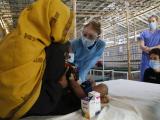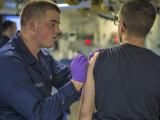Dec 17, 2002 (CIDRAP News) – Two recent public opinion polls suggest that somewhere between half and two thirds of Americans would get a smallpox shot if it were offered, despite the risk of serious side effects.
In a poll on the state of the public health system and bioterrorism preparedness, 65% of 1,002 adults said they were willing to be vaccinated for smallpox. The poll, sponsored by the Robert Wood Johnson Foundation (RWJF), was conducted in late October, and the results were announced Dec 11.
A second poll, focusing exclusively on smallpox vaccination, indicated that 49% of Americans would get a smallpox shot if it were available, while 21% would not and 31% were not sure. The poll of 2,924 adults was conducted in early November by WSJ Online/Harris Interactive, part of the Health Industry Edition of the Wall Street Journal Online. The findings were announced Dec 3.
The RWJF findings were released only 2 days before President Bush announced plans to begin vaccinating about half a million military personnel and up to 450,000 healthcare workers. The president said the government, while not recommending shots for the public now, will try to make the vaccine available for those who want it, starting next spring or summer.
In the RWJF poll, the question about smallpox vaccination followed a series of questions about terrorism in general and bioterrorism in particular. The 65% positive result was a 6-point increase from the finding in a similar poll conducted in May by the Harvard School of Public Health and RWJF. Fourteen percent said they were unsure if they would get the shot, an increase from 7% in the May poll.
In the WSJ Online poll, 42% of respondents favored offering smallpox shots to everyone, with the exception of those clearly at risk for serious complications, as soon as possible. Five percent supported offering the shots only to frontline healthcare workers who would deal with a smallpox outbreak, and 18% favored offering the shots to those healthcare workers plus all police, firefighters, and paramedics.
The WSJ Online survey suggested that many people overestimate the risk of serious side effects of the vaccine. A total of 47% assessed the risk of death associated with the vaccine as higher than the 1 or 2 in a million estimated by medical experts. Eighteen percent said they thought the shots would kill between 11 and 100 people per million vaccinated, while 14% thought the shots would kill more than 100 people per million vaccinated. Five percent believed there is no risk, 39% didn't know, and 8% put the risk at 1 or 2 per million.
In the RWJF survey, 40% of the respondents were very concerned about the possibility of a smallpox attack, and 33% were somewhat concerned. Similar percentages were concerned about the risk of an anthrax attack.
Other findings in the RWJF poll:
- 73% of respondents believed the federal government was very or somewhat prepared to prevent a smallpox outbreak from spreading, while 21% felt the government is not well prepared.
- 57% thought their local hospital was very or somewhat prepared to diagnose and treat people with smallpox, a 13-point decrease from the May survey.
- 63% thought their local health department was prepared to stop the spread of smallpox, down from 66% in the May poll.
- 75% were at least somewhat concerned that the current emphasis on bioterrorism will impair the public health system's efforts in other areas, such as health education, environmental problems, and immunizations. Most said they support increased federal funds for the system and were willing to pay higher taxes for that purpose.
See also:
Harris Interactive news release
http://www.harrisinteractive.com/news/allnewsbydate.asp?NewsID=548















